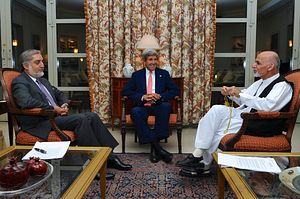The June 3 explosions at a high-profile funeral in Kabul marked the third attack in four days to hit the Afghan capital, killing and injuring hundreds, mostly civilians.
The first attack, on May 31, was a truck bomb that detonated in a high-security zone, followed on June 2 by police firing on protesters demanding the resignation of the National Unity Government (NUG) for what they called a failure to stop deadly militant attacks in the fortified capital.
In the decades-long Afghan conflict, attacks such as the ones carried out during the first week of Ramadan, the Muslim holy month of dawn-to-dusk fasting, are not the first and sadly not going to be the last. But the current wave of terror laid bare the stark realities of Afghanistan’s internal fissures and the prevailing confusion in this war of shadowy characters.
Sensing the apprehensions about widening ethnic rifts among Afghans in the aftermath of the deadly terrorist attacks in Kabul, the United Nations secretary general’s special representative for Afghanistan, Tadamichi Yamamoto, asked for calm. The UN official said that the attack on June 3 was “conducted by those opportunistically seeking to use these very fragile moments to destabilize Afghanistan[…]”
The June 3 attacks saw simultaneous bomb blasts during the funeral of the son of the deputy chairman of the senate, who was killed during the June 2 protests. Soon after, the governor of the northern Balkh province, Atta Muhammad Noor, called the attacks a cowardly conspiracy.
Noor, who is the chief executive of the Jamiat-e-Islami party of late jihadi commander and former Afghan President Burhanuddin Rabbani, pointed an accusing finger at the hidden “hand within the establishment,” accusing these unnamed enemies of trying to wipe out the Jamiat leadership.
Afghan Chief Executive Officer Dr. Abdullah Abdullah, Foreign Minister and interim chief of Jamiat-e-Islami Salahuddin Rabbani, and former chief of Afghanistan’s National Directorate of Security (NDS) Amrullah Saleh were among those attending the funeral.
Expressing concern over the blasts, like Noor, Salahuddin Rabbani said, “We will soon announce our position towards terrorists within the system.” Both Rabbani and Noor are key figures in the Jaimat-e-Islami party.
The statements by the two, and a few other leading figures, point to the widening divide between the two major ethnic camps: The Pashtuns, represented by President Ashraf Ghani, and the Tajiks, led by Abdullah.
The divisions within the National Unity Government (NUG) were well documented by the International Crisis Group (ICG) in its April 2017 report, which warned against political partisanship.
Kabul-based journalists say although the Jamiat leaders have halted their protest demonstrations for the time being, they turned down an invitation by Ghani for a meeting to discuss the latest situation.
In a bid to make an effective alliance, some of the Jamiat leaders also reportedly reached out to other parties, including the Jombesh-e-Milli of first Vice President Abdul Rashid Dostum and the Jombesh-e-Roshnayi of the minority Hazara community.
Since Dostum has already been sidelined by Ghani and sent abroad in mid-May for “medical treatment,” a further widening of differences may likely attract his Jombesh-e-Milli to stand beside the Jamiat-led alliance.
Divisions between the Tajik and Pashtun camps have been no secret since the formation of the NUG. However, analysts believe the arrival of Hezb-e-Islami chief Gulbuddin Hekmatyar, who is also an ethnic Pashtun, to a rousing welcome in Kabul increased the concern among Tajik leadership about Pashtuns’ taking the lion’s share of political control.
To add fuel to the fire of already tense political and ethnic rifts, no claim of responsibility for the attacks came from any of the militant groups that generally rush to own attacks in high-security zones to prove their strength and humble their rivals.
In a statement, Taliban denied their involvement and soon after issued a second statement rejecting the involvement of the Haqqani Network, the group once termed as “veritable arm” of Pakistan’s prime intelligence agency, the Inter-Services Intelligence (ISI).
The so-called Islamic State in Khorasan Province (ISKP), which boldly claimed responsibility for the March 8 attack on a hospital in Kabul, also stayed silent.
Whether this silence is on purpose or otherwise, leaders in the opponent camp called the attacks the handiwork of “inner circles” in the establishment. This internal blame-game is not only weakening the NUG, but also providing a base to the Taliban’s claim that they are not involved.
The now two-and-a-half-year-old National Unity Government was the result of painstaking efforts by former U.S. Secretary of State John Kerry to help buttress the budding Afghan democracy. However, concerns are being expressed at the widening gap between the key partners — Ghani and Abdullah — whose tug of war is not only risking the political process but also effecting the working of key institutions, such as the police and military.
The past 15 years of Taliban insurgency, mixed with government failure to ensure good governance, have created various power centers and interest groups. Any rifts among the top leadership at this stage, while the new U.S. administration is still weighing its options for Afghanistan, will spoil the sacrifices of thousands of men and women, both Afghans and foreigners, made to help the country return to normalcy.
Daud Khattak is Senior Editor for Radio Free Europe Radio Liberty’s Pashto language Mashaal Radio. Before joining RFE/RL, Khattak worked for The News International and London’s Sunday Times in Peshawar, Pakistan. He has also worked for Pajhwok Afghan News in Kabul. The views expressed here are the author’s own and do not represent those of RFE/RL.

































